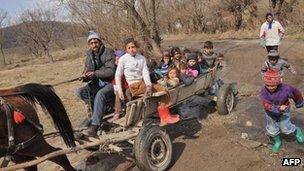Roma face persecution in Europe, says Amnesty
- Published

Roma people across Europe face a range of social disadvantages, says Amnesty
Roma, or Gypsy, communities across Europe are facing widespread persecution, says Amnesty International.
In a new report,, externalthe human rights group says not enough is being done to tackle "shocking" discrimination.
The survey of Roma communities across Europe found they tend to be poorer than the rest of the population, with worse health and lower literacy levels.
It is estimated up to 12 million Roma, Travellers and Gypsies live in Europe.
"Discrimination is one of Europe's most pressing human rights concerns," said Kate Allen, Amnesty's UK director.
She said millions of people were faced exclusion, poverty, ill-treatment or violence, "because of who they are, what they are presumed to be or what they believe", and that the Roma and Traveller populations of Europe "suffer more than most".
The report acknowledges that both individual countries and the European Union as a whole have drawn up strategies to help the social inclusion of the Roma.
But it suggests that such goodwill is rarely translated into sustainable measures on the ground.
Amnesty says Roma people score lower on all key social measures of as unemployment, earnings and access to healthcare.
A survey in 2008 found that one in five of all Roma in Europe had been subjected to racially motivated crime in the previous year.
Among the findings in the report were:
In Slovakia 70% of Roma children are in institutional care
In Kosovo 97% of various Roma groups are unemployed
Roma in Bulgaria face poverty rates four times higher than the rest of the population
In Ireland, the life expectancy of male Travellers is 15 years lower than for men in the wider population
And in Moldova, 59% of Roma live in absolute poverty and half in extreme poverty
Ms Allen said European government had for too long "swept the issue under the carpet".
"It's time Europe woke up and put a full stop to persecution of these marginalised communities," she said.
- Published27 January 2011
- Published29 September 2010
- Published6 January 2012
- Published19 October 2010
- Published5 April 2011
- Published1 February 2011